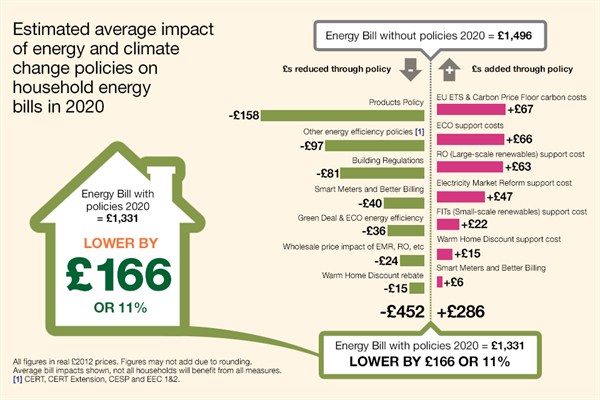
Explainer: Amber Rudd ends Green Deal energy efficiency scheme
Sophie Yeo
07.24.15Sophie Yeo
24.07.2015 | 5:05pmThe Department for Energy and Climate Change (DECC) has announced that the government will no longer fund the Green Deal scheme, which provided loans designed to help homeowners improve the energy efficiency of their property.
The department said that the latest target in its cull of green policies was aimed at protecting taxpayers, and was the result of low take-up of the scheme and concerns about industry standards.
But the government has yet to announce how it will fill the gap in its energy efficiency policies left by the Green Deal.
It comes on the heels of an announcement that subsidies for small scale solar and biomass projects would be scaled back.
DECC has previously forecast that the Green Deal scheme would provide savings on energy bills by 2020, as energy efficiency measures mean that tenants and homeowners pay less to heat their homes.
The government now has the task of designing a replacement scheme that will promote energy efficiency that fits with the Conservative ideals on how to tackle climate change – an approach that secretary of state Amber Rudd promised today would be effective.
What is the Green Deal?
The Green Deal was officially launched in 2013, as a means to cut carbon emissions and save money on energy bills.
The government finances the scheme through the Green Deal Finance Company, which provides loans that can be used to install improvements, such as insulation, double-glazing and solar panels.
The beneficiary then pays back the money through a payment attached to their energy bill, which is cancelled out by the saving made on the bill by the new measures. The loan remained attached to the property, with the duty of paying back the loan falling on whoever pays the bills for the property.
However, the Green Deal did not prove the success that DECC had hoped it would be. Around 15,600 Green Deal plans had been issued by June 2015, according to the latest statistics published yesterday. The f igures by the department show a continuing downward trend on the number of households interested in applying for Green Deal financing.
Number of Green Deal Assessments lodged by month. Source: Domestic Green Deal and Energy Company Obligation in Great Britain, Monthly report
Hiatus
Despite the UK housing stock being counted among the worst in Europe in terms of energy efficiency, the Green Deal programme was far from universally loved. During its short lifespan, it attracted criticisms of being overly complex, maintaining too high an interest rate and attracting rogue companies posing as authorised providers.
In its December 2014 report into energy prices and bills, the government’s independent advisory body, the Committee on Climate Change, recognised the troubles facing the scheme:
“The reduction in funding for the remainder of the Energy Company Obligation, which is currently only committed until 2017, coupled with the poor performance to date of the Green Deal suggests that current policies are insufficient [to deliver savings on energy bills]. Therefore, there is a need to strengthen incentives under current policies and introduce new ones in the future.”
What has upset the industry is that the Green Deal currently has no replacement, with Parliament now due to go into recess until 7 September.
In 2013, the Green Deal was seen as a key part of government plans to bring down household energy bills by £166 in 2020, through clean energy and efficiency measures.
Source: UK government, 2013
But future energy bills are hard to predict, and in November 2014, the government revised downwards the amount that energy efficiency measures could save. Instead, it was predicted that the government’s climate and energy policies would achieve a net saving of around £92 on an average household bill, compared to a situation where the government did nothing. In 2013, as seen in the DECC graphic above, it had predicted this to be £166.
From this £92, £27 was saved by making use of the Green Deal and another policy called the Energy Company Obligation (the figures do not distinguish between the two).
The government has promised to bring down bills and bring in new measures relating to energy efficiency.
Announcing the end to the Green Deal, Amber Rudd said:
“Together we can achieve this government’s ambition to make homes warmer and drive down bills for 1m more homes by 2020 – and to do so at the best value for money for taxpayers.”
She also asked that building industry and consumer groups would work with the government “to make new policy and build a system that works”.
DECC has commissioned an independent review, led by engineer Peter Bonfield, to examine standards, consumer protection and enforce energy efficiency schemes to “ensure that the system properly supports and protects consumers”.
The biggest clue so far on the future of energy efficiency under a Conservative government came from Amber Rudd at a hearing of the Energy and Climate Change Committee on Tuesday, before the announcement regarding the Green Deal had been made.
Promising to make new announcements on the subject in the autumn, Rudd said that she is looking at “various initiatives…so we can work with industry to design a system that will deliver most cost effectively as much as possible”.
She expanded on this as follows:
“I am looking at the Green Deal as part of an entire policy review in this area, and you’re right the green deal policies have not been as successful as first envisaged, but I’m going to be looking at the whole area to see what of our other policies might work better and how we can help people make their homes energy efficient for the least possible cost…
“In terms of the spending review, I will be fighting hard to make sure we prioritise funds to make some energy efficiency available, particularly to the fuel poor. The best way we’ve found to deliver that has been through the energy companies, but it doesn’t mean that we have unlimited funds by putting it on people’s bills. I want to make sure we keep those prices down in the most energy efficient way, so I’m going to be talking to the energy companies about how best to do that…
“I want to try to make sure we have a system whereby tenants can ask their landlords, which is currently in place, whereby they have to deliver at their request as long as it’s at no additional cost. At the moment, that is envisaged to be delivered through the Green Deal and I will be looking at how we can best deliver that to make sure there is some ‘pay as you save’ model available so landlords cannot unreasonably withhold permission to take this action and we can continue to improve the housing stock in this country which is so important.”
Conclusion
With the price of gas still fluctuating, it remains difficult to predict what energy bills will look like in 2020 and beyond. Until Rudd’s autumn announcement, no one will know exactly what the Conservative’s energy efficiency policy will look like either, much to the frustration of the green buildings industry.
What could these measures look like? Based on Rudd’s comments earlier this week, it appears that it will involve energy companies, and some sort of continuation of the “pay as you save” method.
Carbon Brief asked members of the industry what it would like to see proposed in the coming months. Josh Robson from Knauf Insulation responded with the following comment:
“Unexpected changes cause uncertainty and the announcements about the Green Deal yesterday, without any news as to its replacement, were unhelpful. However, a review of the Green Deal was needed as it had not yet delivered for households in the way that it was intended.
“A new ‘pay as you save’ scheme for people who are able to fund improvements themselves will be needed. This should fit more closely with consumer behaviour with a relaxed golden rule so more measures are available. It should also be available through high street banks so that people can look at improvements when they purchase a property. Wider incentives, such as reductions in stamp duty and council tax for homes that have been improved, will help provide the best outcomes for homeowners and first time buyers.”
However, the Green Deal itself will not be sorely missed, and a well-designed new framework could be an opportunity for the government to prove that it is serious about reducing emissions and improving the UK’s housing stock.



